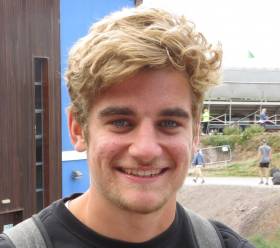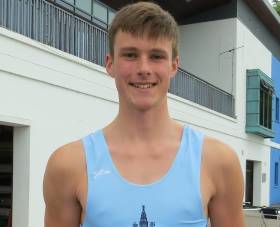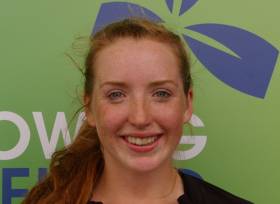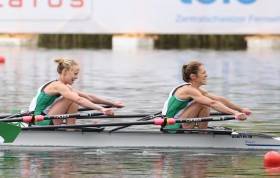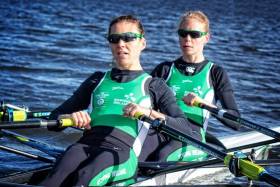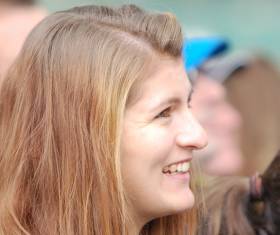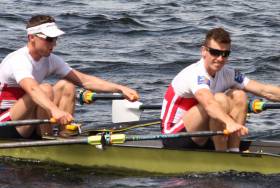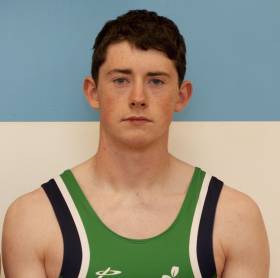Displaying items by tag: Lynch
#Rowing: Ireland finished fourth in their heat of the men’s coxed four at the World Under-23 Championships in Florida today. Only the winner of the heat qualified directly for the A Final. Ireland were up with Germany and Australia in the first quarter. From there, Australia pushed out and away from the rest to win. Britain and Germany took second and third.
Ireland will compete in a repechage with hopes of making the A Final in this eight-boat event.
World Rowing Under-23 Championships, Sarasota, United States (Irish interest)
Men
Four, coxed – Heat Two (Winner to A Final; rest to Repechages): 1 Australia 6:11.99; 4 Ireland (B O’Rourke, R Corrigan, D Lynch, J Quinlan; cox: E Finnegan) 6:18.79.
Dorney and Lynch top Junior Rankings at All Ireland Open and Youth Regatta
Jack Dorney of Shandon won the junior 18 single sculls at the Irish Open and All Ireland Junior Regatta at the National Rowing Centre in Cork today. His nearest rival was James O’Donovan of Castleconnell. Both represented Ireland this season and both are junior again for the 2019 season.
Aoife Lynch of Lee was the top junior woman, just ahead of Lauren O’Brien of Castleconnell.
The best women’s open pair of the day was the UCC/Skibbereen combination of Tara Hanlon and Niamh Casey.
Fifth Place in Semi for Battling Junior Double at World Rowing
#Rowing: Ireland's Ronan Byrne and Daire Lynch finished fifth in their semi-final of the junior double sculls at the World Rowing Championships in Rotterdam today. Drawn in the very tough lane one and battling against the worst of the wind, the Irish passed Lithuania and pressed the Netherlands hard, though the host nation held on to fourth. Germany, Italy and Hungary took the A Final places. Ireland will compete in a B Final.
The junior women's double of Aoife Casey and Emily Hegarty were also in the tough lane one. They finished sixth in a race won by Greece. Ireland will fight for a good placing in the B Final on Sunday.
World Rowing Championships, Rotterdam (Irish interest; selected results)
Men
Lightweight Pair - A Final: 1 France 7:14.18, 2 Denmark 7:15.30, 3 Britain (J Cassells, S Scrimgeour) 7:16.49; 4 Ireland (M O'Donovan, S O'Driscoll) 7:24.6, 5 China 7:32.48, 6 United States 7:36.91.
Lightweight Single Sculls - A Final: 1 Ireland (P O'Donovan) 7:32.84, 2 Hungary (P Galambos) 7:36.95, 3 Slovakia (L Babac) 7:38.89; 4 Slovenia (R Hrvat) 7:41.07, 5 Germany (K Steinhuebel) 7:48.66, 6 Serbia (M Stanojevic) 7:49.03.
Junior Double Sculls - Semi-Final One (First Three to A Final; rest to B Final): 1 Germany 7:17.47, 2 Italy 7:18.14, 3 Hungary 7:29.93; 5 Ireland (R Byrne, D Lynch) 7:36.48.
Women
Four - A Final: 1 Britain (3 H Nixon) 7:16.28.
Junior Double Sculls - Semi-Final Two (First Three to A Final; rest to B Final): 1 Greece 7:57.20, 2 Germany 7:58.97, 3 Australia 7:59.61; 6 Ireland (A Casey, E Hegarty) 8:12.31.
Lynch and Lambe Give Ireland Place in Olympic Rowing Final
#Rowing: Sinead Lynch and Claire Lambe qualified for the Olympic Games A Final in Rio de Janeiro today. The Ireland lightweight double finished third behind the Netherlands and Canada, holding off Denmark in a very controlled and impressive performance.
In the first semi-final South Africa won from New Zealand, with China taking third.
Olympic Games, Rio de Janeiro (Irish interest; selected results)
Women
Lightweight Double Sculls - Semi-Finals (First Three to A Final; rest to B Final)
Semi-Final One: 1 South Africa 7:19.09, 2 New Zealand 7:19.27, 3 China 7:20.94.
Semi-Final Two: 1 Netherlands 7:13.93, 2 Canada 7:16.35, 3 Ireland (C Lambe, S Lynch) 7:18.24; 4 Denmark 7:20.29, 5 United States 7:22.78, 6 Germany 7:33.21.
Ireland Rowers Prepare for New Olympic Schedule
#Rowing: The two Ireland lightweight doubles will compete in their deferred heats tomorrow (Monday) at the Olympic Games in Rio de Janeiro. Under the new schedule put in place by Fisa, the lightweight women's double are set to go into action at 3.30 Irish time and the lightweight men at 3.50. The Sunday programme had to be cancelled because the course was not rowable.
Ireland Crews Wait As Weather Forces Rowing Cancellation
#Rowing: The Olympic rowing programme for today, Sunday, has been postponed. The strong crosswinds disrupted a number of races on Saturday and left the Serbian men's pair in the water after a capsize. Ireland single sculler Sanita Puspure had complained about the conditions, saying the boats would not be put out to train in such difficult waters. Two Ireland boats, the women’s lightweight double of Sinead Lynch and Claire Lambe and the men’s lightweight double of Paul and Gary O’Donovan were due to compete in their first race today, but must now wait.
#Rowing: Skibbereen took two of the three senior titles on offer in the evening session of the second day of the Irish Rowing Championships at the National Rowing Centre. The women's pair of Denise Walsh and Aoife Casey beat UCC, while the men's quadruple held off a late charge by a Queen's/Portadown composite.
Monika Dukarska of Killorglin won the women's senior single. She was dominant all the way, with only Siobhan McCrohan of Tribesmen testing her to any degree.
The junior women's eight gave Cork Boat Club a chance to impress. They led for most of the race, and while Bann held an overlap through the middle of the course, Cork were clear winners.
Trinity were extraordinarily dominant in the men's novice eight - their win by 11 seconds was cheered lustily by their fans.
Shandon fought through the opposition offered by Carlow to win the junior men's quadruple, and Roisin Maguire of Queen's was the best club single sculler.
The man of the day was, arguably, the Clonmel competitor Daire Lynch. The teenager added the men's intermediate single scull to the club title he had won earlier in the day. He passed Declan O'Connor of St Michael's in the middle stages of the race and won well.
Irish Rowing Championships, National Rowing Centre, Cork
Day Two (Selected results)
Men
Eight - Intermediate: Commercial 5:43.182. Novice: Trinity 6:00.157.
Four - Junior, coxed: 1 Cork A 6:29.20, 2 Portora 6:35.341, 3 Clonmel 6:40.716.
Pair - Senior: 1 Skibbereen 6:30.311, 2 UCD 6:33.546, 3 Portora 6:44.968.
Sculling, Quadruple - Senior: 1 Skibbereen 5:59.102, 2 Queen's/Portadown 5:59.790, 3 Shandon A 6:08.509. Junior: 1 Shandon 6:07.970, 2 Carlow B 6:13.361, 3 Three Castles 6:13.799.
Single - Inter: Clonmel (D Lynch) 7:04.573. Club: Clonmel (D Lynch) 7:15.463.
Women
Eight - Novice: Trinity 7:09.594. Junior: 1 Cork 1 Cork 6:39.271, 2 Bann 6:44.193, 3 Portora 6:49.287.
Pair - Senior: 1 Skibbereen 7:23.775, 2 UCC 7:29.369, 3 Trinity 7:46.166.
Sculling, Double - Inter: Lee 7:22.252.
Single - Senior: 1 Killorglin (M Dukarska) 7:35.069, 2 Tribesmen (S McCrohan) 7:50.320, 3 Skibbereen (O Hayes) 7:57.742. Club: Queen's (R Maguire) 8:15.155. Junior: 1 Skibbereen (E Hegarty) 8:05.674, 2 Neptune (C Feerick) 8:13.065, 3 Castleconnell (J Vascotto) 8:15.002.
Lynch Has Terrific Win at Irish Rowing Championships
#Rowing: Two outstanding races brought the first session of the Irish Rowing Championships at the National Rowing Centre to a close today. Daire Lynch of Clonmel won the junior single sculls. He caught and passed Shandon's Ronan Byrne in the final quarter, but Byrne refused to give in easily and the two swept towards the finish line with a small margin separating them - Lynch won by just over four tenths of a second.
The junior women's double had a similar profile: Skibbereen hunted down and caught leaders Bann and held off their late charge to win by just over three tenths of a second.
UCD had a surprisingly emphatic win over a Skibbereen/UCC composite in the women's senior four - a first senior win for bow woman Eimear Lambe. In the men's double, Shane O'Driscoll and Mark O'Donovan were similarly impressive in their win over Old Collegians.
Neptune had started the session with their first Championships win in years, in the novice coxed quadruple. Fermoy won the women's Club coxed four, while Cork and NUIG won hte women's intermediate pair and men's intermediate coxed four respectively.
Irish Rowing Championships, National Rowing Centre, Cork, Day One (Selected Results)
Men
Four - Inter, coxed: 1 NUIG 6:26.811.
Sculling, Quadruple - Novice, coxed: Neptune 6:44.559.
Double - Senior: 1 Skibbereen 6:32.773, 2 UCD 6:34.914, 3 Castleconnell 6:39.727.
Single - Junior: 1 Clonmel (D Lynch) 7:04.040, 2 Shandon (R Byrne) 7:04.462, 3 Shandon (S O'Sullivan) 7:23.197.
Women
Four - Senior: 1 UCD 6:54.652, 2 Skibbereen/UCC 6:58.902, 3 Trinity 7:04.715. Club, coxed: Fermoy 7:16.116.
Pair - Intermediate: Cork 7:36.488
Sculling
Double - Junior: 1 Skibbereen B 7:19.682, 2 Bann 7:91.995, 3 Neptune 7:33.305.
Junior Doubles Impress at Cork Regatta
#Rowing: NUIG and UCC won the division one men's and women's fours by big margins in the first set of Sunday finals at Cork Regatta at the National Rowing Centre. The division one doubles provided a stage for junior crews with international aspirations. In changeable conditions, Aoife Casey and Emily Hegarty won in an excellent time and Ronan Byrne and Daire Lynch were second to senior internationals Shane O'Driscoll and Mark O'Donovan.
Cork Regatta (Coillte Grand League), National Rowing Centre, Sunday
Men
Four - Div One - A Final: 1 NUIG (senior) 6:15.798. Div Two, coxed - A Final: 1 Cork (club 2) 6:45.96; 4 Presentation (jun 18) 7:01.82. B Final: 5 Pres (jun 16) 7:45.27.
Sculling - Double - Div One - A Final: 1 Skibbereen (M O'Donovan, S O'Driscoll; sen) 6:35.19, 2 Shandon/Clonmel 6:42.47; 6 Shandon A (inter) 7:07.91. B Final: 2 Shandon (jun 18) 6:51.83. C Final: 5 Cork (club 1) 7:51.21.
Single - Div Two - A Final: 1 Skibbereen (K Mannix; jun 18) 7:30.79, 2 Carlow (J Keating; jun 16) 7:32.62; 4 Lee (H Sutton; club 2) 7:38.78.
Women
Four - Div One - A Final: 1 UCC (sen) 7:08.25; 3 Shandon (jun 18) 7:17.69.
Sculling, Double - Div One - A Final: 1 Skibbereen (E Hegarty, A Casey; jun 18) 7:13.15, 2 Bann (jun 18) 7:22.69; 5 Belfast BC (club 1) 7:34.93. B Final: 2 Commercial (inter) 7:47.37; 3 Skibbereen (sen) 7:47.68.
Lynch and Lambe Edged Out of Medals in Record-Breaking Race
#Rowing: Claire Lambe and Sinead Lynch had to settle for fourth in a terrific lightweight double sculls World Cup Final in Poznan. The Netherlands had an excellent start, but Denmark set the pace through the middle stages, with Ireland and world champions New Zealand well in touch. The Kiwis pushed right up by the final 300 metres, and it became a three-boat race, with Ireland just behind. The Netherlands won in a new world best time, with Denmark and New Zealand taking silver and bronze.
World Cup Regatta, Poznan (Irish interest; selected results)
Men
Lightweight Double Sculls - A Final: 1 France (P Houin, J Azou) 6:11.92, 2 Norway (K Brun, A Strandli) 6:14.01, 3 Italy (A Micheletti, M Miani) 6:14.67; 4 Ireland (G O'Donovan, P O'Donovan) 6:15.46, 5 Britain (W Fletcher, R Chambers) 6:20.71, 6 Austria 6:26.06.
Women
Lightweight Double Sculs - A Final: 1 Netherlands (I Paul, M Head) 6:47.69 (World Best Time), 2 Denmark (AL Thomsen, J Rasmussen) 6:49.10, 3 New Zealand (S MacKenzie, J Edward) 6:50.65; 4 Ireland (C Lambe, S Lynch) 6:55.22, 5 Poland 6:55.85, 6 Italy 6:56.92.


























